§Science
Science is a human concept.
It can represent:
- the observation, identification, description, experimental investigation, and theoretical explanation of phenomena
- a systematic method or body of knowledge in a given area
- comprehension or understanding of facts or principles
- accumulated and established knowledge, which has been systematized and formulated with reference to the discovery of general truths or the operation of general laws
- knowledge classified and made available in work, life, or the search for truth; comprehensive, profound, or philosophical knowledge
- knowledge gained by systematic observation, experiment, and reasoning; knowledge coordinated, arranged, and systematized
- knowledge derived from scientific disciplines, scientific method, or any systematic effort
All scientific knowledge is temporary, not a claim of absolute truth.
Not even the scientists themselves cannot agree on what is absolutely true.
If you think a scientific subject is absolutely agreed upon, it's because you didn't hear all the experts – because they were censored.
Most people consider the "scientific truth" to be absolute, but forget that only a few years back, many "scientific truths" were different.
Science: "This is it! We finally found the truth this time! We won't change it anymore, we promise!"
If science was never questioned, you'd still be drinking cocaine, giving kids cough syrup with heroin and cigars, spraying people with DDT, and smoking the cigarette brand your doctor recommended.
The great power of a scientific theory is in its ability to quantitatively make predictions that can be verified or refuted by experiment or observations.
When one gets censored by trying to question science it becomes Dogma and is cult like, which is the opposite of how true science works.
Nowadays, there are many kinds of science: science, scientism, "Trust The $cience", popsci, etc.
If authorities invoke "The Science" to justify heavy-handed measures, those who refuse to blindly follow "The Holy Science" are treated as the modern equivalent of a heretic.
The scientific method:
- observe a natural phenomenon
- alternate hypothesis
- independent variable (the presumed cause)
- dependent variable (the observed effect)
- control variable
- null hypothesis: X doesn't cause Y
- test / experiment
- analyze the observations / data
- validate / invalidate the hypothesis
- the burden of proof is on the one making the scientific claim
Science shouldn't be believed! Nobody should believe in science, that's not how it works!
Gallery
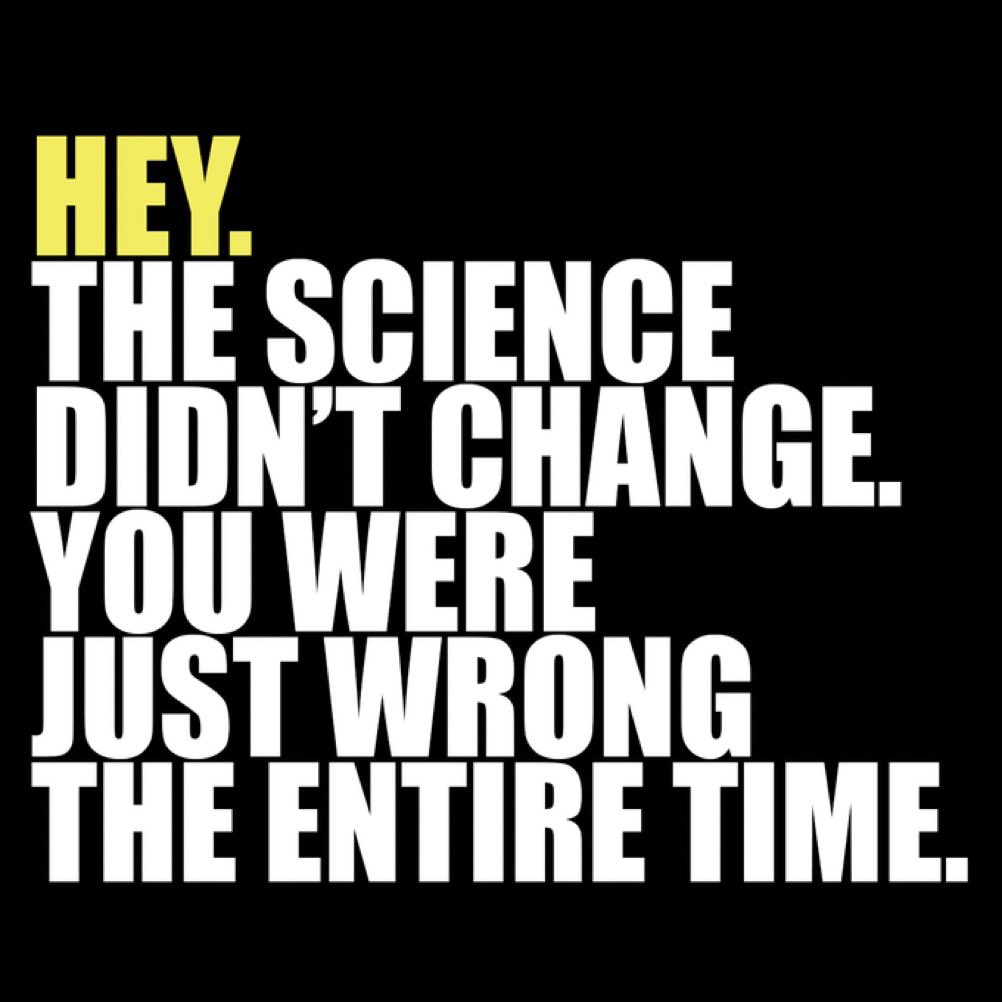
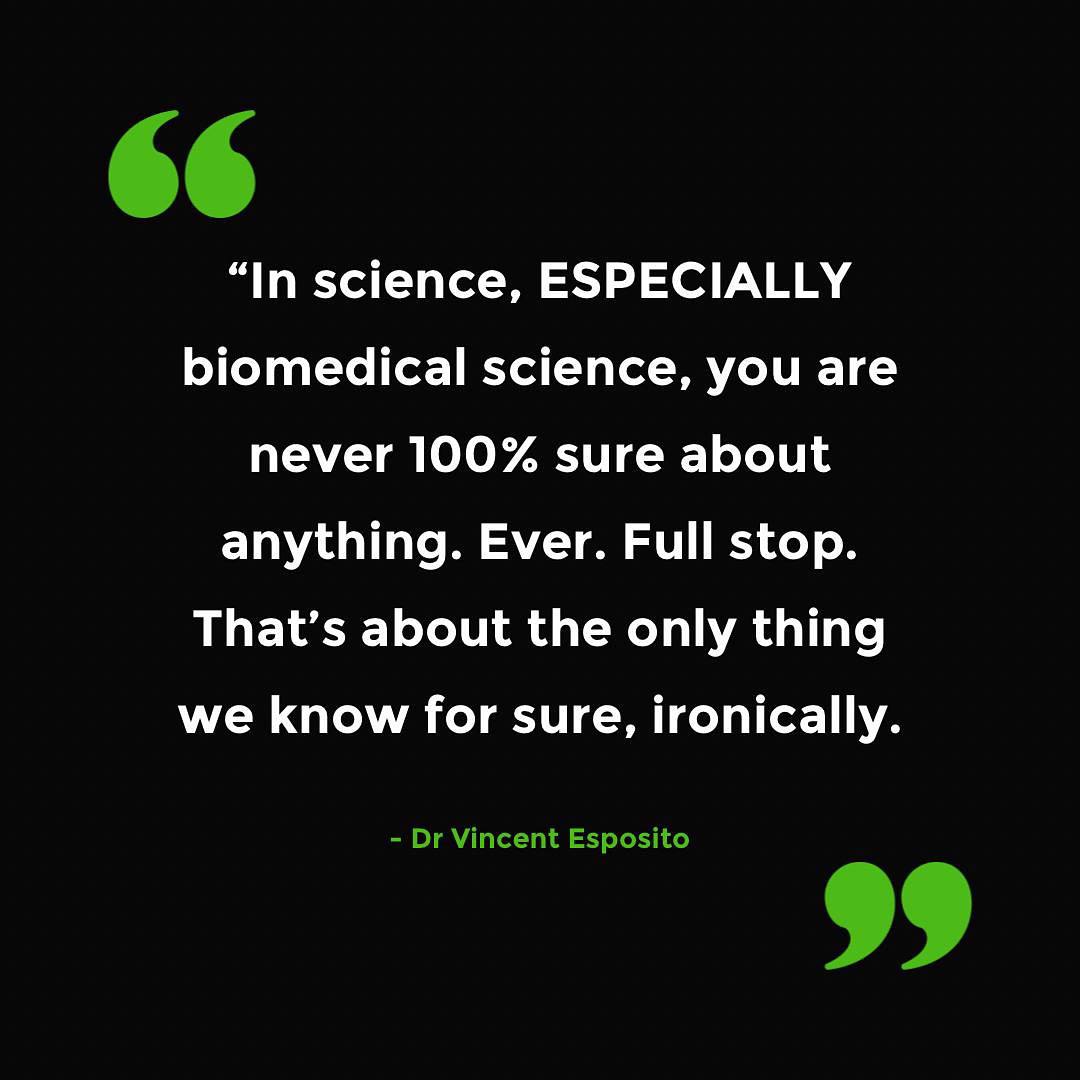
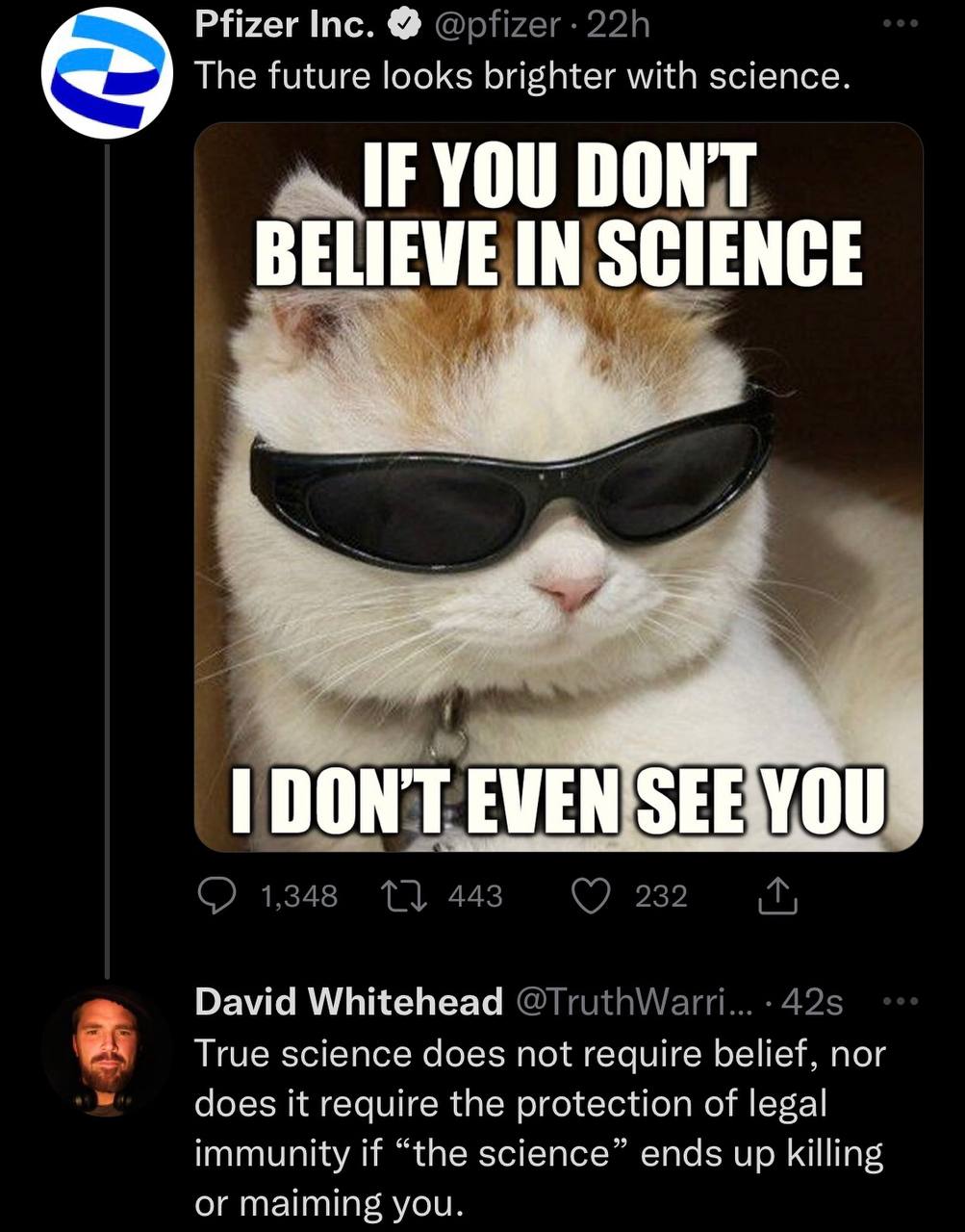
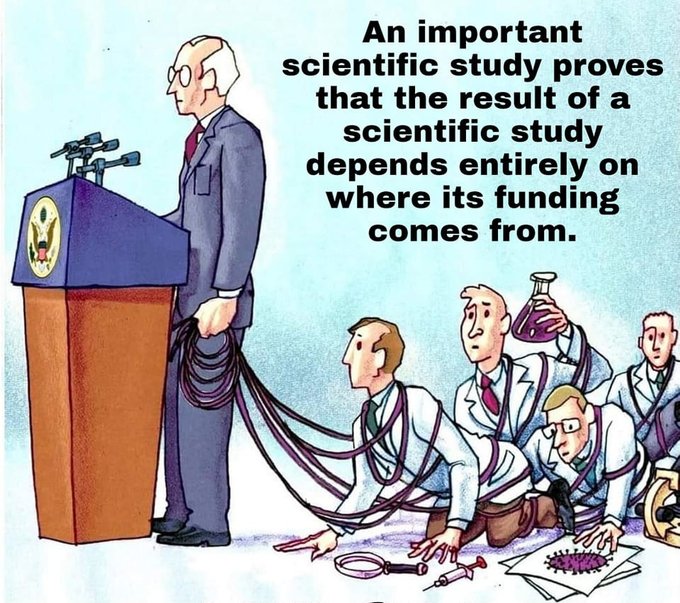
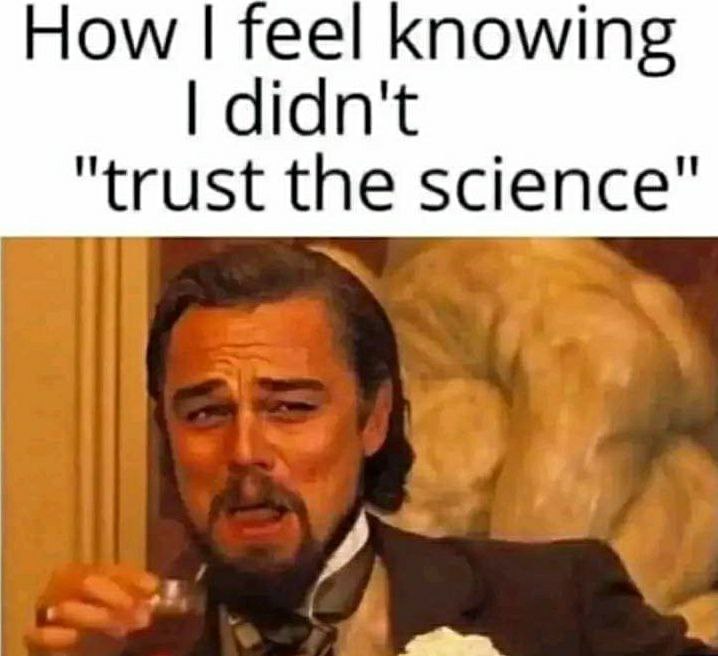
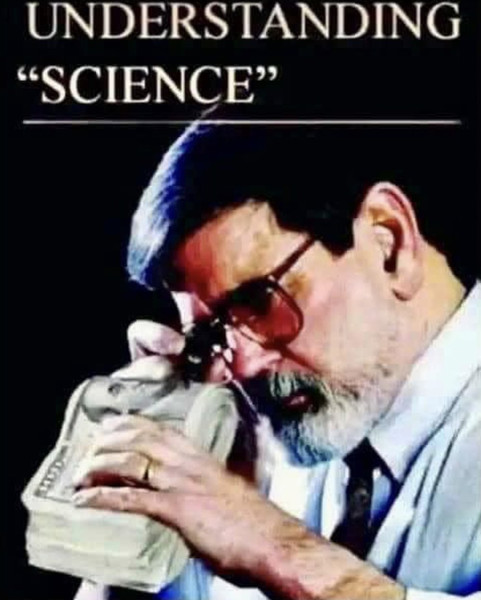
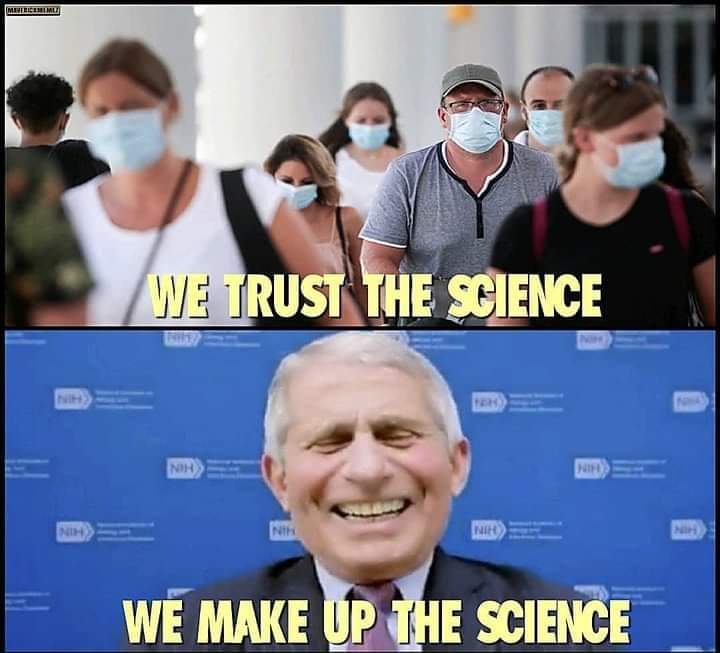
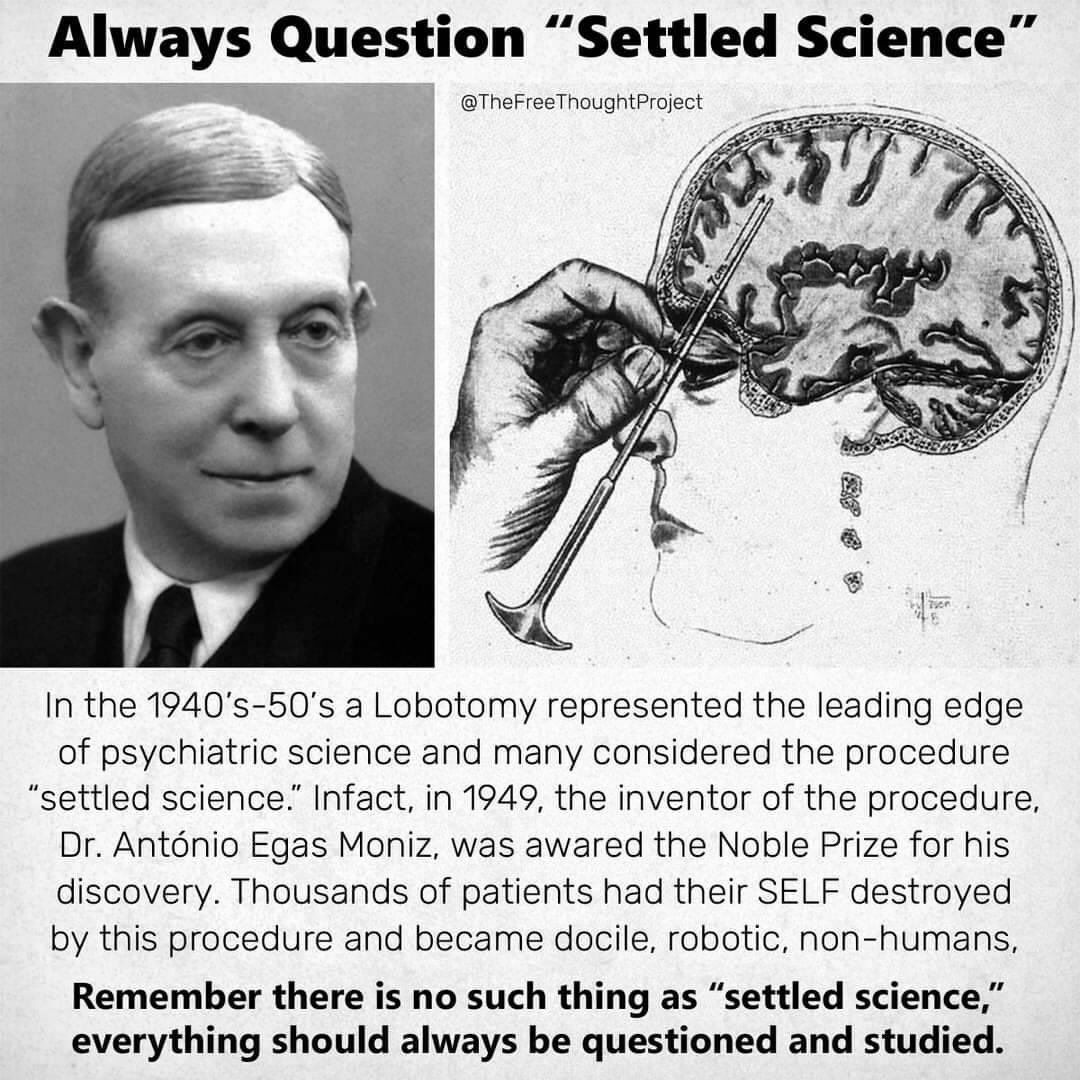
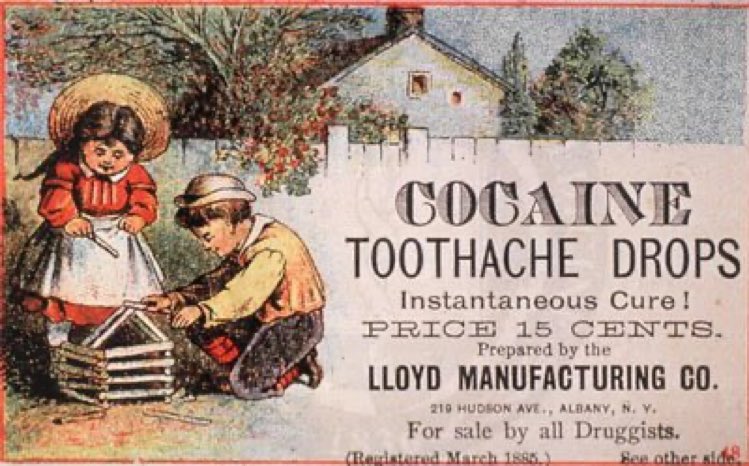
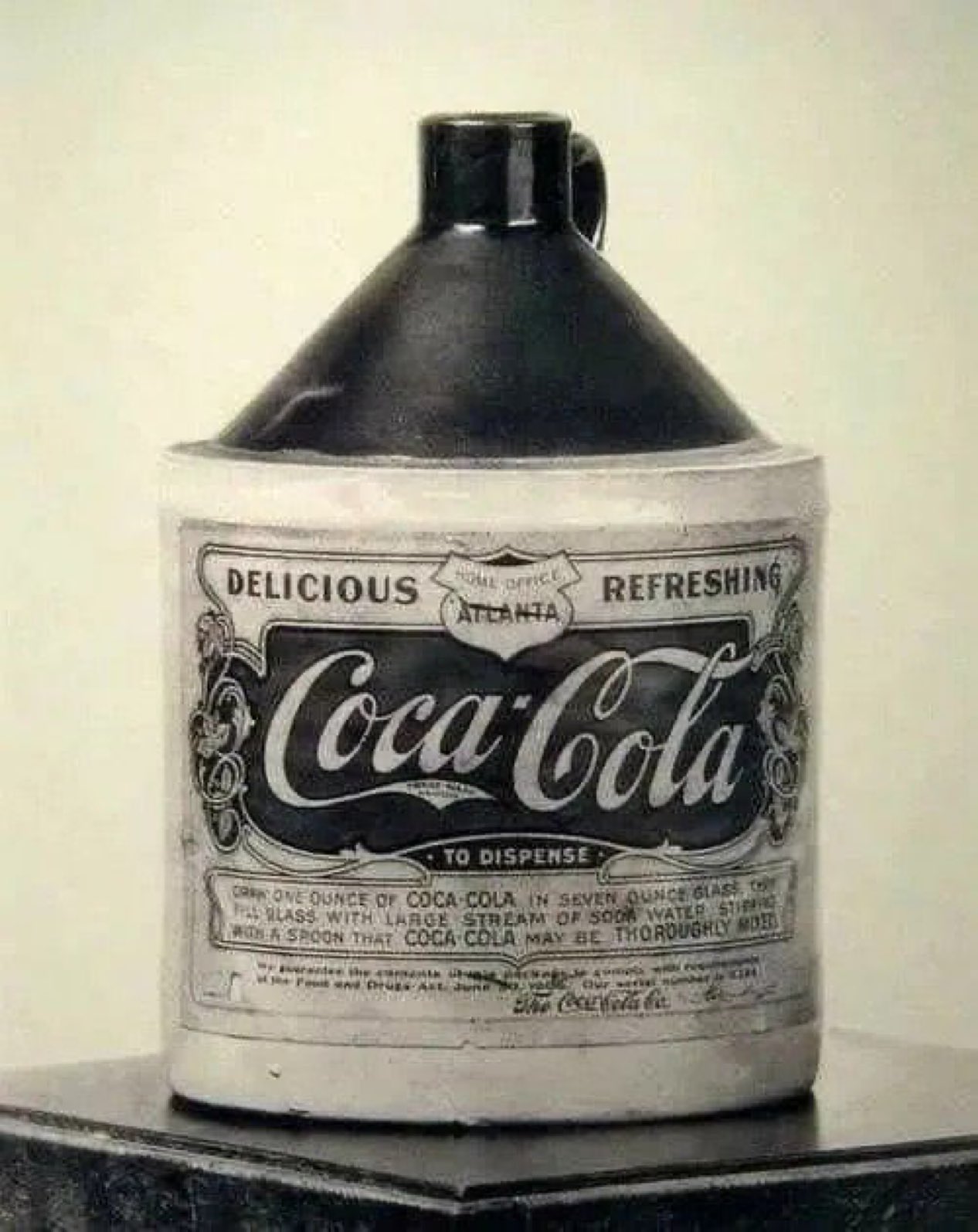
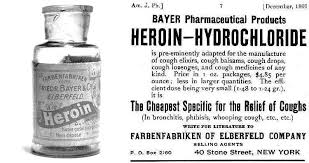
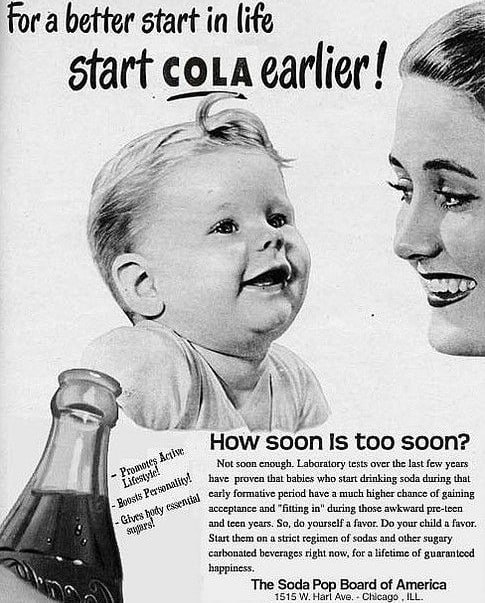
Quotes
Observe the effect. Invent the cause. It's $science.
(this ⮧ is NOT true science, it's The Holy $cience)
I represent $cience. If you're attacking me, you're really attacking $cience, I mean, everybody knows that!
– Dr. Anthony Fauci
We have found it of paramount importance that in order to progress, we must recognize our ignorance and leave room for doubt. Scientific knowledge is a body of statements of varying degrees of certainty - some most unsure, some nearly sure, but none absolutely certain. Now, we scientists are used to this, and we take it for granted that it is perfectly consistent to be unsure, that it is possible to live and not know.
– Richard P. Feynman
In science, ESPECIALLY biomedical science, you are never 100% sure about anything. Ever. Full stop. That's about the only thing we know for sure, ironically.
– Dr Vincent Esposito
There is no point in using the word 'impossible' to describe something that has clearly happened.
– Douglas Adams, Dirk Gently's Holistic Detective Agency
The good thing about science is that it's true whether or not you believe in it.
– Neil deGrasse Tyson
Statements like: 'The Science says' serve as the twenty-first-century equivalent of the exhortation 'God said'. Unlike science, the term 'The Science serves a moralistic and political project. It has more in common with a pre-modern revealed truth than with the spirit of experimentation that emerged with modernity. The constant refrain of 'Scientists tell us' serves as a prelude for a lecture on what threat to fear… those who do not heed the warnings of "experts" are frequently castigated as irresponsible, if not evil.
– Frank Furedi, How Fear Works: Culture of Fear in the Twenty-First Century
It turned out I was pretty good in science. But again, because of the small budget, in science class we couldn't afford to do experiments in order to prove theories. We just believed everything.
Actually, I think that class was called Religion. Religion class was always an easy class. All you had to do was suspend the logic and reasoning you were being taught in all the other classes.
― George Carlin, Brain Droppings
It is simply no longer possible to believe much of the clinical research that is published, or to rely on the judgment of trusted physicians or authoritative medical guidelines. I take no pleasure in this conclusion, which I reached slowly and reluctantly over my two decades as an editor of The New England Journal of Medicine.
– Dr. Marcia Angell, NY Review of Books, January 15, 2009, Drug Companies & Doctors: A Story of Corruption
Religion's eleventh commandment is "Thou shalt not question".
– Freud
Articles
The beginning of infinity, by Naval
Trust The "Science"...That just retracted 11,000 "peer reviewed" papers
By Tyler Durden, posted May 27, 2024
https://zerohedge.com/markets/trust-sciencethat-just-retracted-11000-peer-reviewed-papers
It's yet another reminder of why blindly 'trusting the science' may not always be the best go-to move in the future.
"It's not just a scam, it’s an industry. Who knew, academic journals were a $30 billion dollar industry?"
Nova writes that shockingly, these papers undergo peer review without any rigorous human oversight, allowing egregious errors, like converting 'local average energy' to 'territorial normal vitality', to slip through.
So much for "peer review" - Wiley shuts down 19 science journals and retracts 11,000 gobbledygook papers
By Jo Nova
https://joannenova.com.au/2024/05/so-much-for-peer-review-wiley-shuts-down-19-science-journals-and-retracts-11000-fraudulent-or-gobblygook-papers
Proving that unpaid anonymous review is worth every cent, the 217 year old Wiley science publisher “peer reviewed” 11,300 papers that were fake, and didn’t even notice. It’s not just a scam, it’s an industry. Naked “gobbledygook sandwiches” got past peer review, and the expert reviewers didn’t so much as blink.
Big Government and Big Money has captured science and strangled it. The more money they pour in, the worse it gets. John Wiley and Sons is a US $2 billion dollar machine, but they got used by criminal gangs to launder fake “science” as something real.
Things are so bad, fake scientists pay professional cheating services who use AI to create papers and torture the words so they look “original”. Thus a paper on ‘breast cancer’ becomes a discovery about “bosom peril” and a ‘naïve Bayes’ classifier became a ‘gullible Bayes’. An ant colony was labeled an ‘underground creepy crawly state’.
Medicine is plagued by untrustworthy clinical trials. How many studies are faked or flawed?
https://nature.com/articles/d41586-023-02299-w
https://doi.org/10.1038/d41586-023-02299-w
By Richard Van Noorden, posted 18 July 2023
Investigations suggest that, in some fields, at least one-quarter of clinical trials might be problematic or even entirely made up, warn some researchers. They urge stronger scrutiny.
Carlisle, an anaesthetist who works for England's National Health Service, is renowned for his ability to spot dodgy data in medical trials. He is also an editor at the journal Anaesthesia, and in 2017, he decided to scour all the manuscripts he handled that reported a randomized controlled trial (RCT) - the gold standard of medical research. Over three years, he scrutinized more than 500 studies1.
For more than 150 trials, Carlisle got access to anonymized individual participant data (IPD). By studying the IPD spreadsheets, he judged that 44% of these trials contained at least some flawed data: impossible statistics, incorrect calculations or duplicated numbers or figures, for instance. And 26% of the papers had problems that were so widespread that the trial was impossible to trust, he judged - either because the authors were incompetent, or because they had faked the data.
Carlisle called these 'zombie' trials because they had the semblance of real research, but closer scrutiny showed they were actually hollow shells, masquerading as reliable information. Even he was surprised by their prevalence. "I anticipated maybe one in ten," he says.
"I think journals should assume that all submitted papers are potentially flawed and editors should review individual patient data before publishing randomised controlled trials," Carlisle wrote in his report.
Carlisle rejected every zombie trial, but by now, almost three years later, most have been published in other journals - sometimes with different data to those submitted with the manuscript he had seen. He is writing to journal editors to alert them, but expects that little will be done.
Medical research has always had fraudsters. Roberts, for instance, first came across the issue when he co-authored a 2005 systematic review for the Cochrane Collaboration, a prestigious group whose reviews of medical research evidence are often used to shape clinical practice. The review suggested that high doses of a sugary solution could reduce death after head injury. But Roberts retracted it2 after doubts arose about three of the key trials cited in the paper, all authored by the same Brazilian neurosurgeon, Julio Cruz. (Roberts never discovered whether the trials were fake, because Cruz died by suicide before investigations began. Cruz's articles have not been retracted.)
A more recent example is that of Yoshihiro Sato, a Japanese bone-health researcher. Sato, who died in 2016, fabricated data in dozens of trials of drugs or supplements that might prevent bone fracture. He has 113 retracted papers, according to a list compiled by the website Retraction Watch. His work has had a wide impact: researchers found that 27 of Sato's retracted RCTs had been cited by 88 systematic reviews and clinical guidelines, some of which had informed Japan's recommended treatments for osteoporosis.
Many researchers worried by medical fakery agree with Carlisle that it would help if journals routinely asked authors to share their IPD. "Asking for raw data would be a good policy. The default position has just been to trust the study, but we've been operating from quite a naive position," says Wilkinson. That advice, however, runs counter to current practice at most medical journals.
In 2016, the International Committee of Medical Journal Editors (ICMJE), an influential body that sets policy for many major medical titles, had proposed requiring mandatory data-sharing from RCTs. But it got pushback - including over perceived risks to the privacy of trial participants who might not have consented to their data being shared, and the availability of resources for archiving the data. As a result, in the latest update to its guidance, in 2017, it settled for merely encouraging data sharing and requiring statements about whether and where data would be shared.
Besides asking for data, journal editors could also speed up their decision-making, research-integrity specialists say. When sleuths raise concerns, editors should be prepared to put expressions of concern on medical studies more quickly if they don't hear back from authors, Avenell says. This April, a UK parliamentary report into reproducibility and research integrity said that it should not take longer than two months for publishers to publish corrections or retractions of research when academics raise issues.
And if journals do retract studies, authors of systematic reviews should be required to correct their work, Avenell and others say. This rarely happens. Last year, for instance, Avenell's team reported that it had carefully and repeatedly e-mailed authors and journal editors of the 88 reviews that cited Sato's retracted trials to inform them that their reviews included retracted work. They got few responses - only 11 of the 88 reviews have been updated so far - suggesting that authors and editors didn't generally care about correcting the reviews.
How to choose which scientists to trust
https://bigthink.com/thinking/credible-science
By Matt Fuchs, posted July 11 2023
Learn to spot the scientists who are searching for the truth rather than money, ego, or fame
It's no easy task these days for people to pick the scientists they should follow. According to a recent poll by NORC at the University of Chicago, only 39 percent of Americans have a "great deal" of confidence in the scientific community. The finding is similar to Pew research last year showing that 29 percent of Americans have this level of confidence in medical scientists.
Avoid scientists who sound overly confident
Avoid scientists who sound overly confident in messaging to the public. Some multi-talented scientists are adept at publishing in both top journals and media outlets. They're great at dropping science without the confusing jargon, in ways the public can enjoy and learn from.
But do they talk in simple soundbites, painting scientific debates in pastels or black and white when colleagues use shades of gray? Maybe they crave your attention more than knowledge seeking. "When scientists speak in a very unnuanced way, that can be irresponsible," said Josephine Johnston, a bioethicist at the Hastings Center.
Scientists should avoid exaggerations like "without a doubt" and even "we know" – unless they absolutely do. "I feel like there's more and more hyperbole and attention seeking… [In aging research,] the loudest voices in the room are the fringe people," said the biogenerontologist Matt Kaeberlein.
Watch out for cult behavior
Watch out for cult behavior, some experts told me. Follow scientists who mix it up and engage in debates, said NYU bioethicist Arthur Caplan, not those who hang out only with researchers in the same ideological camp.
Don't overvalue credentials
Just because a scientist works at a top university doesn't mean they're completely trustworthy. "The institution means almost nothing," Kaeberlein said.
Consider company ties
Companies can help scientists bring their research to the public more directly and efficiently than the slower grind of academia, where "the opportunities and challenges weren't big enough for me," said Kaeberlein, who left the University of Washington earlier this year.
"It's generally not universities that can take technology through what we call the valley of death," Brenner said. "There are rewards associated with taking risks."
Many scientists are upfront about their financial conflicts of interest – sometimes out of necessity. "At a place like Duke, our conflicts of interest are very closely managed, said Matthew Hirschey, who researchers metabolism at Duke's Molecular Physiology Institute. "We have to be incredibly explicit about our partnerships."
But the willingness to disclose conflicts doesn't necessarily mean the scientist is any less biased. Those conflicts can still affect their views and outcomes of their research, said Johnston, the Hastings bioethicist.
Scientific Bullshit - How 'Science' is used to deceive the public
By Gavin Nascimento, published 2018-12-21
https://anewkindofhuman.com/science-is-used-to-deceive-the-public
Today, a number of questionable practices in the name of science continue. Sadly, the manipulation (or incompetence) of science is something that most likely will never be truly eliminated from society because it is rooted in human fallibility and corruption. In fact, Richard Hortin, the editor in chief of the medical journal The Lancet, has gone on record as stating that, "much of the scientific literature, perhaps half, may simply be untrue."
Blinded with science
Enough that basing government policy on "peer-reviewed studies" isn't all it's cracked up to be
By Donna Laframboise, published 29 October 2016
https://spectator.co.uk/article/blinded-with-science
We're continually assured that government policies are grounded in evidence, whether it's an anti-bullying programme in Finland, an alcohol awareness initiative in Texas or climate change responses around the globe.
"Science" itself, we're told, is guiding our footsteps…
Richard Horton, editor of The Lancet, admitted that "much of the scientific literature, perhaps half, may simply be untrue." In his words, "science has taken a turn toward darkness."
Medical research, psychology, and economics are all in the grip of a 'reproducibility crisis.' A pharmaceutical company attempting to confirm the findings of 53 landmark cancer studies was successful in only six instances, a failure rate of 89%. In 2012, a psychology journal devoted an entire issue to reliability problems in that discipline, with one essay titled "Why science is not necessarily self-correcting." Likewise, a 2015 report prepared for the Board of Governors of the US Federal Reserve concluded that "economics research is usually not replicable." Its authors were able to verify the findings of only one third of 67 papers published in reputable economics journals. After enlisting the help of the original researchers, the success rate rose to a still dismal 49%.
Government policies can't be considered evidence-based if the evidence on which they depend hasn't been independently verified, yet the vast majority of academic research is never put to this test. Instead, something called peer review takes place. No one examines the raw data for accuracy or the computer code for errors. Peer review doesn't guarantee that proper statistical analyses were employed, or that lab equipment was used properly.
Referees at the most prestigious of journals have given the green light to research that was later found to be wholly fraudulent. Conversely, they've scoffed at work that went on to win Nobel Prizes. Richard Smith, a former editor of the British Medical Journal, describes peer review as a roulette wheel, a lottery, and a black box. He points out that an extensive body of research finds scant evidence that this vetting process accomplishes much at all. On the other hand, a mountain of scholarship has identified profound deficiencies.
Peer review's random and arbitrary nature was demonstrated as early as 1982. Twelve already published papers were assigned fictitious author and institution names before being resubmitted to the same journal 18-32 months later. The duplication was noticed in three instances, but the remaining nine papers underwent review by two referees each. Only one paper was deemed worthy of seeing the light of day the second time it was examined by the same journal that had already published it.
How many scientists fabricate and falsify research? A systematic review and meta-analysis of survey data?
By Daniele Fanelli, published May 29, 2009
A pooled weighted average of 1.97% of scientists admitted to have fabricated, falsified or modified data or results at least once –a serious form of misconduct by any standard and up to 33.7% admitted other questionable research practices. In surveys asking about the behaviour of colleagues, admission rates were 14.12% for falsification and up to 72% for other questionable research practices.
https://journals.plos.org/plosone/article?id=10.1371/journal.pone.0005738
https://doi.org/10.1371/journal.pone.0005738
Before you read another health study, check who's funding the research
Food companies have a bad history of funding biased research to support their products. Guardian took a look at a few egregious recent examples
New York University nutrition professor Marion Nestle began informally tracking studies funded by food and beverage companies, as well as trade groups, in 2015. Her research uncovered 168 such studies in that year alone, and of those, 156 showed biased results that favored the sponsor's interests
By Alison Moodie, published 2016-12-12
https://theguardian.com/lifeandstyle/2016/dec/12/studies-health-nutrition-sugar-coca-cola-marion-nestle
Raise standards for pre-clinical cancer research
C. Glenn Begley and Lee M. Ellis propose how methods, publications and incentives must change if patients are to benefit.
By C. Glenn Begley & Lee M. Ellis, published 02 May 2012
https://nature.com/articles/483531a
Data fraud in clinical trials
Stephen L George and Marc Buyse
https://ncbi.nlm.nih.gov/pmc/articles/PMC4340084
https://pubmed.ncbi.nlm.nih.gov/25729561
https://dx.doi.org/10.4155%2Fcli.14.116
Highly publicized cases of fabrication or falsification of data in clinical trials have occurred in recent years and it is likely that there are additional undetected or unreported cases.
- How common is data fraud?
- A few prominent cases;
- Dr. Roger Poisson of St. Luc Hospital in Montréal, Canada had committed scientific fraud by fabrication or falsification of data on NSABP breast cancer trials from 1977 through 1990
- Dr. Werner Beswoda, a professor and chair of the Department of Hematology and Oncology at the University of Witwatersrand in Johannesburg, South Africa had a plenary session presentation in May 1999. An independent audit team conducted an onsite audit of records from the trial. No medical records of any kind were available for many patients, including over 20% of the patients on the high-dose chemotherapy arm; for patients for whom records could be located there was little evidence that eligibility criteria had been met for nearly two-thirds of the patients; and no evidence could be found that informed consent had been obtained or that the trial had been approved by the appropriate University human research oversight committee. Shortly after the audit results were known, it was announced by the University that Beswoda had been removed from his position and that he had admitted to scientific misconduct.
- Dr. Robert Fiddes was the director of the Southern California Research Institute, a for-profit institution, and was the lead clinical investigator for a large number of clinical trials conducted for pharmaceutical company sponsors. He had been conducting scientific fraud on an impressive scale for over a decade. Dr. Fiddes pled guilty to fraud in 1997, and was sentenced to 15 months in prison.
- Dr. Harry W Snyder Jr, a prominent dermatologist and scientist at BioCryst Pharmaceuticals, a biotech company founded in 1986 in Birmingham, Alabama, was overseeing a clinical trial sponsored by BioCryst at the University of Alabama at Birmingham (UAB), where his wife, Renee Peugot, a registered nurse at the University, was the study coordinator responsible for the day-to-day conduct of the trial. Both had considerable financial interests in BioCryst and a vested interest in the outcome of the trial.
- Why do they do it?
- Detection of fraud?
- Examples of fraud
- Examples of technical problems
"The Doctors' Choice is America's Choice"
The Physician in US Cigarette Advertisements, 1930–1953
Martha N. Gardner, PhD and Allan M. Brandt, PhD, published 2006 February
https://ncbi.nlm.nih.gov/pmc/articles/PMC1470496
https://pubmed.ncbi.nlm.nih.gov/16434689
https://dx.doi.org/10.2105%2FAJPH.2005.066654
In the 1930s and 1940s, smoking became the norm for both men and women in the United States, and a majority of physicians smoked. At the same time, there was rising public anxiety about the health risks of cigarette smoking. One strategic response of tobacco companies was to devise advertising referring directly to physicians. As ad campaigns featuring physicians developed through the early 1950s, tobacco executives used the doctor image to assure the consumer that their respective brands were safe. These advertisements also suggested that the individual physicians' clinical judgment should continue to be the arbiter of the harms of cigarette smoking even as systematic health evidence accumulated. However, by 1954, industry strategists deemed physician images in advertisements no longer credible in the face of growing public concern about the health evidence implicating cigarettes.
Sugar industry manipulated research about health effects, study finds
Published September 13 2016
https://npr.org/2016/09/13/493801090
A study in the Journal of the American Medical Association Internal Medicine describes efforts by the sugar industry to manipulate research about the health effects of sugar back in the 1960s.
Sugar industry withheld research into effects of sucrose 50 years ago, study claims
Researchers say negative health impacts of sucrose could have been combated sooner had research been released - but industry bodies dispute the findings
By Jessica Brown, published 2017-11-21
https://theguardian.com/science/blog/2017/nov/21/sugar-industry-withheld-research-effects-of-sucrose-50-years-ago-study-claims
https://journals.plos.org/plosbiology/article?id=10.1371/journal.pbio.2003460
https://doi.org/10.1371/journal.pbio.2003460
Researchers claim that the International Sugar Research Foundation (ISRF) withheld findings that rats that were fed a high-sugar diet had higher levels of triglycerides (a fat found in the blood) than those fed starch. In a move researchers from the University of California at San Francisco have compared to the tobacco industry's self-preservation tactics, the foundation stopped funding the project.
Coca-Cola funds scientists who shift blame for obesity away from bad diets
By Anahad O'Connor, published 2015-08-09
https://well.blogs.nytimes.com/2015/08/09/coca-cola-funds-scientists-who-shift-blame-for-obesity-away-from-bad-diets
Coca-Cola, is backing a new "science-based" solution to the obesity crisis: To maintain a healthy weight, get more exercise and worry less about cutting calories.
How candy makers shape nutrition science
By Candice Choi, published 2016-06-02
https://apnews.com/article/science-nutrition-healthy-eating-archive-only-on-ap-f9483d554430445fa6566bb0aaa293d1
It was a startling scientific finding: Children who eat candy tend to weigh less than those who don't!!
Less startling was how it came about. The paper, it turns out, was funded by a trade association representing the makers of Butterfingers, Hershey and Skittles. And its findings were touted by the group even though one of its authors didn't seem to think much of it.
Relationship between Funding Source and Conclusion among Nutrition-Related Scientific Articles
By Lenard I Lesser,Cara B Ebbeling,Merrill Goozner,David Wypij,David S Ludwig
Published 2007-01-09
- https://journals.plos.org/plosmedicine/article?id=10.1371/journal.pmed.0040005#s3
- https://doi.org/10.1371/journal.pmed.0040005
- https://doi.org/10.1371/journal.pmed.0040005.g002
- https://doi.org/10.1371/journal.pmed.0040005.t003
Bush aide softened greenhouse gas links to global warming
By Andrew C. Revkin, published 2005-06-08
https://nytimes.com/2005/06/08/politics/bush-aide-softened-greenhouse-gas-links-to-global-warming.html
A White House official who once led the oil industry's fight against limits on greenhouse gases has repeatedly edited government climate reports in ways that play down links between such emissions and global warming, according to internal documents.
In handwritten notes on drafts of several reports issued in 2002 and 2003, the official, Philip A. Cooney, removed or adjusted descriptions of climate research that government scientists and their supervisors, including some senior Bush administration officials, had already approved. In many cases, the changes appeared in the final reports.
The dozens of changes, while sometimes as subtle as the insertion of the phrase "significant and fundamental" before the word "uncertainties," tend to produce an air of doubt about findings that most climate experts say are robust.
Before going to the White House in 2001, he was the "climate team leader" and a lobbyist at the American Petroleum Institute, the largest trade group representing the interests of the oil industry. A lawyer with a bachelor's degree in economics, he has no scientific training.
Merck accused of stonewalling in mumps Vaccine antitrust lawsuit
By Brendan Pierson, published 2015-06-04
https://reuters.com/article/health-vaccine/merck-accused-of-stonewalling-in-mumps-vaccine-antitrust-lawsuit-idUSL1N0YQ0W820150604
Two former Merck & Co Inc scientists accusing the drugmaker of falsifying tests of its exclusive mumps vaccine said in a court filing on Monday that Merck is refusing to respond to questions about the efficacy of the vaccine.
Merck has been consistently evasive, using "cut-and-paste" answers saying it cannot run a new clinical trial to determine the current efficacy, and providing only data from 50 years ago.
"Merck should not be permitted to raise as one of its principal defenses that its vaccine has a high efficacy, which is accurately represented on the product's label, but then refuse to answer what it claims that efficacy actually is" the letter said.
Professor admits faking AIDS vaccine to get $19M in grants
By Andy Soltis, published December 26 2013
https://nypost.com/2013/12/26/professor-admits-faking-aids-vaccine-to-get-19m-in-grants
- An Iowa State University professor resigned after admitting he falsely claimed rabbit blood could be turned into a vaccine for the AIDS virus.
- Dr. Dong-Pyou Han spiked a clinical test sample with healthy human blood to make it appear that the rabbit serum produced disease-fighting antibodies, officials said.
Dictionary
- https://dictionary.com/browse/science
- https://merriam-webster.com/dictionary/science
- https://thefreedictionary.com/science
- https://urbandictionary.com/define.php?term=Science
- https://wiktionary.org/wiki/science
- https://wordnik.com/words/science
Links
- https://britannica.com/science/science
- https://citizendium.org/wiki/Science
- https://citizendium.org/wiki/Scientific_method
- https://commons.wikimedia.org/wiki/Category:Science
- https://curlie.org/en/Science
- https://rationalwiki.org/wiki/War_on_Science
- https://science.howstuffworks.com
- https://wikipedia.org/wiki/Branches_of_science
- https://wikipedia.org/wiki/Category:Engineering
- https://wikipedia.org/wiki/Category:Science
- https://wikipedia.org/wiki/Category:Technology
- https://wikipedia.org/wiki/List_of_scientific_misconduct_incidents
- https://wikipedia.org/wiki/Outline_of_science
- https://wikipedia.org/wiki/Science
- https://wikipedia.org/wiki/Scientific_method
- https://wikipedia.org/wiki/Synthetic_biology